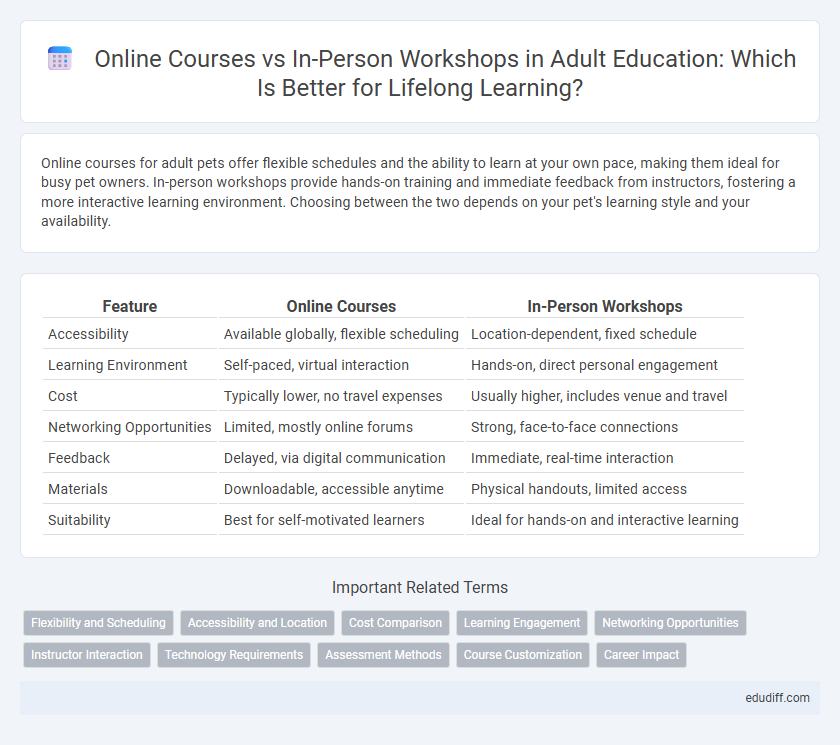Online courses for adult pets offer flexible schedules and the ability to learn at your own pace, making them ideal for busy pet owners. In-person workshops provide hands-on training and immediate feedback from instructors, fostering a more interactive learning environment. Choosing between the two depends on your pet's learning style and your availability.
Table of Comparison
| Feature | Online Courses | In-Person Workshops |
|---|---|---|
| Accessibility | Available globally, flexible scheduling | Location-dependent, fixed schedule |
| Learning Environment | Self-paced, virtual interaction | Hands-on, direct personal engagement |
| Cost | Typically lower, no travel expenses | Usually higher, includes venue and travel |
| Networking Opportunities | Limited, mostly online forums | Strong, face-to-face connections |
| Feedback | Delayed, via digital communication | Immediate, real-time interaction |
| Materials | Downloadable, accessible anytime | Physical handouts, limited access |
| Suitability | Best for self-motivated learners | Ideal for hands-on and interactive learning |
Flexibility and Scheduling
Online courses offer unparalleled flexibility by allowing adults to learn at their own pace and schedule, accommodating busy lifestyles and varying time zones. In-person workshops provide fixed schedules and structured environments, which may limit availability but enhance real-time interaction and hands-on experience. Choosing between the two depends on balancing the convenience of self-paced learning against the benefits of direct engagement and immediate feedback.
Accessibility and Location
Online courses offer unparalleled accessibility, allowing adult learners to engage from any location with internet connectivity, eliminating geographical barriers. In-person workshops require physical presence, which can limit participation based on travel distance, time constraints, and mobility issues. The flexibility of online formats supports diverse schedules and learning paces, making education more inclusive for adults balancing work and family commitments.
Cost Comparison
Online courses generally offer lower costs than in-person workshops due to reduced expenses for facilities, materials, and travel. Many platforms provide subscription models or one-time payments ranging from $20 to $500, whereas in-person workshops can exceed $1,000 when factoring in venue fees and instructor rates. Cost efficiency is a critical advantage of online learning for adult education and professional development.
Learning Engagement
Online courses offer interactive multimedia tools and flexible pacing that enhance learner engagement by allowing adults to tailor their experience to individual needs. In-person workshops provide real-time social interaction, immediate feedback, and hands-on practice, fostering deeper connection and active participation. Combining both methods can optimize engagement through personalized learning paths and collaborative environments.
Networking Opportunities
Online courses offer flexible learning but limit face-to-face networking, reducing spontaneous interactions and relationship-building. In-person workshops foster direct personal connections and immediate feedback, enhancing professional networking and collaboration. Effective networking in adult education often thrives in environments that encourage real-time communication and shared experiences.
Instructor Interaction
Online courses offer flexible access to expert instructors through live chats, video calls, and forums, facilitating personalized feedback and immediate clarification. In-person workshops provide direct, face-to-face interaction that enhances hands-on learning and allows for spontaneous discussions and real-time adjustments based on participant needs. Both formats emphasize instructor interaction but differ in immediacy and the depth of personal connection.
Technology Requirements
Online courses demand reliable high-speed internet, compatible devices like laptops or tablets, and updated software to access platforms smoothly. In-person workshops require minimal technology, often limited to presentation equipment used by facilitators, allowing participants to engage without digital constraints. Technology requirements significantly influence accessibility and convenience for adult learners choosing between these educational formats.
Assessment Methods
Online courses often utilize digital quizzes, interactive assignments, and automated grading systems to provide immediate feedback and track learner progress efficiently. In-person workshops rely heavily on face-to-face assessments such as group activities, presentations, and real-time skill demonstrations, enabling instructors to gauge participant engagement and comprehension directly. Both formats emphasize formative and summative evaluation but differ in the immediacy and depth of personalized assessment methods.
Course Customization
Online courses offer extensive customization options, allowing adult learners to tailor content pacing, topics, and learning methods to fit individual needs and schedules. In-person workshops provide hands-on, real-time interaction but generally follow a fixed curriculum with less flexibility in content adaptation. Customizable online platforms often incorporate adaptive learning technologies and personalized assessments, enhancing engagement and skill retention for diverse adult learners.
Career Impact
Online courses offer flexible learning schedules, allowing professionals to upskill without disrupting their current jobs, which enhances career advancement opportunities. In-person workshops provide hands-on experiences and direct networking with industry experts, fostering deeper skill acquisition and stronger professional connections. Both methods impact career growth, but the choice depends on an individual's learning style and industry requirements.
Online courses vs In-person workshops Infographic

 edudiff.com
edudiff.com